


|
| ||
|
|
|
|
|
|
SILVER EDITION

|


|
SILVER EDITION |
|
Publication History
Cover Overview |
Reviews and Previews
Chapter Overview |
Word Cloud
[NEW]
First Chapter Preview [NEW] |
Cover Gallery (year)
Cover Gallery (edition) |
 Cover Overview
Cover Overview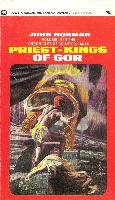

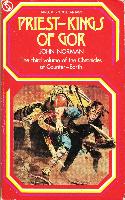
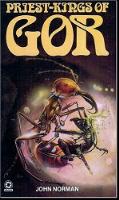
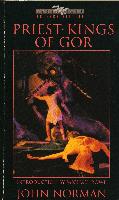

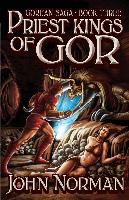
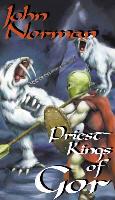


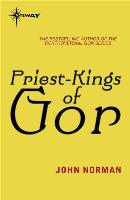

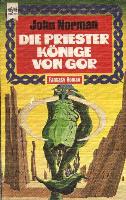
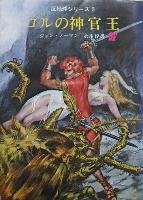
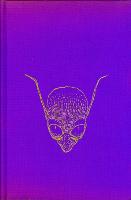
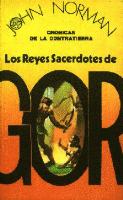
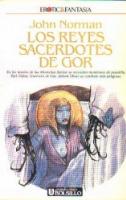
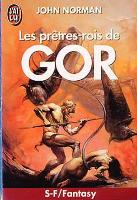
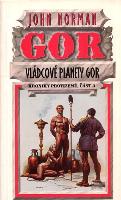
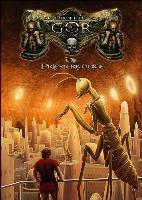
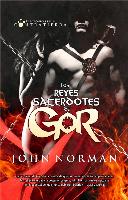
 Reviews and Previews
Reviews and PreviewsHere is an overview of the 35 chapters in Priest-Kings of Gor:
 Word Cloud
Word CloudThe image below shows the most often used words and terms within Priest-Kings of Gor. The larger the size, the more often the word or term occurs in the text.
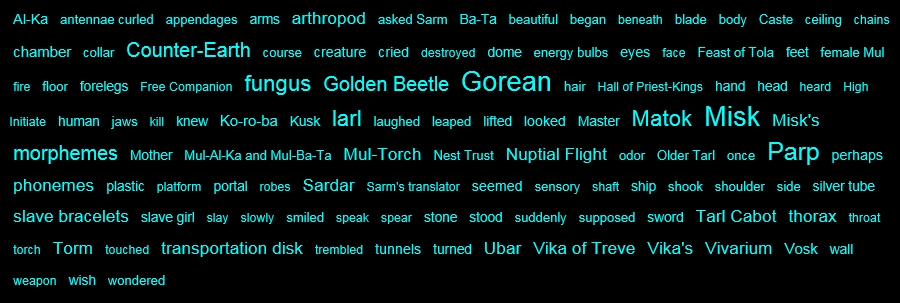
 First Chapter Preview
First Chapter PreviewIt came about late in the month of En'Kara in the year 10,117 from the founding of the city of Ar that I came to the Hall of Priest-Kings in the Sardar Mountains on the planet Gor, our Counter-Earth.
I had arrived four days before on tarnback at the black palisade that encircles the dreaded Sardar, those dark mountains, crowned with ice, consecrated to the Priest-Kings, forbidden to men, to mortals, to all creatures of flesh and blood.
The tarn, my gigantic, hawklike mount, had been unsaddled and freed, for it could not accompany me into the Sardar. Once it had tried to carry me over the palisade into the mountains, but never again would I have essayed that flight. It had been caught in the shield of the Priest-Kings, invisible, not to be evaded, undoubtedly a field of some sort, which had so acted on the bird, perhaps affecting the mechanism of the inner ear, that the creature had become incapable of controlling itself and had fallen disoriented and confused to the earth below. None of the animals of Gor, as far as I knew, could enter the Sardar. Only men could enter, and they did not return.
I regretted freeing the tarn, for it was a fine bird, powerful, intelligent, fierce, courageous, loyal. And, strangely, I think it cared for me. At least I cared for it. And only with harsh words could I drive it away, and when it disappeared in the distance, puzzled, perhaps hurt, I wept.
It was not far to the fair of En'Kara, one of the four great fairs held in the shadow of the Sardar during the Gorean year, and I soon walked slowly down the long central avenue between the tents, the booths and stalls, the pavilions and stockades of the fair, toward the high, brassbound timber gate, formed of black logs, beyond which lies the Sardar itself, the sanctuary of this world's gods, known to the men below the mountains, the mortals, only as Priest-Kings.
I would stop briefly at the fair, for I must purchase food for the journey into the Sardar and I must entrust a leather-bound package to some member of the Caste of Scribes, a package which contained an account of what had occurred at the city of Tharna in the past months, a short history of events which I thought should be recorded.*
* This is undoubtedly the manuscript which was subsequently published under the title Outlaw of Gor. One gathers from Cabot's remarks above that he was, at the time of writing, not aware of the fate of the manuscript. The title Outlaw of Gor, incidentally, is mine, not Cabot's. This is also the case, perhaps it should be mentioned, with the first book, Tarnsman of Gor, and the present book, Priest-Kings of Gor. For some reason Cabot never entitles his manuscripts. Perhaps he thinks of them not so much as books as personal records or histories, written perhaps as much for himself as for others. An account, incidentally, of how I came into possession of the ms. Outlaw of Gor precedes that book, which, like the others, I have had the privilege of editing. Suffice it here to say that the current manuscript, like the others, was tendered to me by my friend, and now my lawyer, young Harrison Smith of the city. Smith has had the pleasure of knowing Cabot personally, having originally met him several years ago in New England and having been able to renew the acquaintance briefly in New York City something over a year ago. Indeed, our first account of the Counter-Earth, Tarnsman of Gor, was entrusted to Smith personally by Cabot, who shortly thereafter disappeared. This manuscript, the third, was received, according to Smith, under substantially the same unusual conditions as the second, conditions which he kindly delineated in a preface contributed to that volume. In all this I regret only that I have never had the pleasure of meeting Cabot personally. There is a real Cabot, of course. I know that he exists, or existed. In so far as I have been able I have checked into these matters with great care. There was indeed a Tarl Cabot, answering the description of these accounts, who was raised in Bristol, and who attended Oxford and taught in the small New England college referred to in the first book, and who subsequently rented an apartment in midtown Manhattan at dates congruent with the accounts in the first and second books. In short, what can be confirmed, I have confirmed. Beyond this of course we have only the accounts of Cabot himself, brought to my attention by Smith, which we may or may not accept.—J. N.
I wished that I had had longer to visit the fair, for on another occasion at another time I should have sought eagerly to examine its wares, drink at its taverns, talk with its merchants and attend its contests, for these fairs are free ground for the many competitive, hostile Gorean cities, and provide almost the sole opportunity for the citizens of various cities to meet peaceably with one another.
It is little wonder then that the cities of Gor support and welcome the fairs. Sometimes they provide a common ground on which territorial and commercial disputes may be amicably resolved without loss of honor, plenipotentiaries of warring cities having apparently met by accident among the silken pavilions.
Further, members of castes such as the Physicians and Builders use the fairs for the dissemination of information and techniques among Caste Brothers, as is prescribed in their codes, in spite of the fact that their respective cities may be hostile. And, as might be expected, members of the Caste of Scribes gather here to enter into dispute and examine and trade manuscripts.
My small friend, Torm of Ko-ro-ba, of the Caste of Scribes, had been to the fairs four times in his life. He informed me that in this time he had refuted seven hundred and eight scribes from fifty-seven cities, but I will not vouch for the accuracy of the report, as I sometimes suspect that Torm, like most members of his caste, and mine, tends to be a bit too sanguine in recounting his numerous victories. Moreover I have never been too clear as to the grounds on which the disputes of scribes are to be adjudicated, and it is not too infrequently that both disputants leave the field each fully convinced that he has had the best of the contest. In differences among members of my own caste, that of the Warriors, it is easier to tell who has carried the day, for the defeated one often lies wounded or slain at the victor's feet. In the contests of scribes, on the other hand, the blood that is spilled is invisible and the valiant foemen retire in good order, reviling their enemies and recouping their forces for the next day's campaign. I do not hold this against the contests of scribes; rather I commend it to the members of my own caste.
I missed Torm and wondered if I would ever see him again, bounding about excoriating the authors of dusty scrolls, knocking the inkwell from his desk with an imperial sweep of the sleeve of his blue robe, leaping on the table in birdlike fury denouncing one scribe or another for independently rediscovering an idea that had already appeared in a century-old manuscript known to Torm of course but not to the luckless scribe in question, rubbing his nose in his robe, shivering, leaping down to thrust his feet against the everpresent, overloaded charcoal brazier that invariably burned under his table, amid the litter of his scraps and parchments, regardless of whatever the outside temperature might be.
I supposed Torm might be anywhere, for those of Ko-ro-ba had been scattered by the Priest-Kings. I would not search the fair for him, nor if he were here would I make my presence known, for by the will of Priest-Kings no two men of Ko-ro-ba might stand together, and I had no wish to jeopardize the little scribe. Gor would be the poorer were it not for his furious eccentricities; the Counter-Earth would simply not be the same without belligerent, exasperated little Torm. I smiled to myself. If I should meet him I knew he would thrust himself upon me and insist on being taken into the Sardar, though he would know it would mean his death, and I would have to bundle him in his blue robes, hurl him into a rain barrel and make my escape. Perhaps it would be safer to drop him into a well. Torm had stumbled into more than one well in his life and no one who knew him would think it strange to find him sputtering about at the bottom of one.
The fairs, incidentally, are governed by Merchant Law and supported by booth rents and taxes levied on the items exchanged. The commercial facilities of these fairs, from money changing to general banking, are the finest I know of on Gor, save those in Ar's Street of Coins, and letters of credit are accepted and loans negotiated, though often at usurious rates, with what seems reckless indifference. Yet perhaps this is not so puzzling, for the Gorean cities will, within their own walls, enforce the Merchant Law when pertinent, even against their own citizens. If they did not, of course, the fairs would be closed to the citizens of that city.
The contests I mentioned which take place at the fairs are, as would be expected, peaceable, or I should say, at least do not involve contests of arms. Indeed it is considered a crime against the Priest-Kings to bloody one's weapons at the fairs. The Priest-Kings, I might note, seem to be more tolerant of bloodshed in other localities.
Contests of arms, fought to the death, whereas they may not take place at the fairs, are not unknown on Gor, and are popular in some cities. Contests of this sort, most often involving criminals and impoverished soldiers of fortune, offer prizes of amnesty or gold and are customarily sponsored by rich men to win the approval of the populace of their cities. Sometimes these men are merchants who wish thereby to secure goodwill for their products; sometimes they are practitioners of the law, who hope to sway the votes of jury men; sometimes they are Ubars or High Initiates who find it in their interests to keep the crowds amused. Such contests, in which life is lost, used to be popular at Ar, for example, being sponsored in that city by the Caste of Initiates, who regard themselves as being intermediaries between Priest-Kings and men, though I suspect that, at least on the whole, they know as little about the Priest-Kings as do other men. These contests, it might be mentioned, were banned in Ar when Kazrak of Port Kar became administrator of that city. It was not an action which was popular with the powerful Caste of Initiates.
The contests at the fairs, however, I am pleased to say, offer nothing more dangerous than wrestling, with no holds to the death permitted. Most of the contests involve such things as racing, feats of strength, and skill with bow and spear. Other contests of interest pit choruses and poets and players of various cities against one another in the several theaters of the fair. I had a friend once, Andreas of the desert city of Tor, of the Caste of Poets, who had once sung at the fair and won a cap filled with gold. And perhaps it is hardly necessary to add that the streets of the fair abound with jugglers, puppeteers, musicians and acrobats who, far from the theaters, compete in their ancient fashions for the copper tarn disks of the broiling, turbulent crowds.
Many are the objects for sale at the fair. I passed among wines and textiles and raw wool, silks, and brocades, copperware and glazed pottery, carpets and tapestries, lumber, furs, hides, salt, arms and arrows, saddles and harness, rings and bracelets and necklaces, belts and sandals, lamps and oils, medicines and meats and grains, animals such as the fierce tarns, Gor's winged mounts, and tharlarions, her domesticated lizards, and long chains of miserable slaves, both male and female.
Although no one may be enslaved at the fair, slaves may be bought and sold within its precincts, and slavers do a thriving business, exceeded perhaps only by that of Ar's Street of Brands. The reason for this is not simply that here is a fine market for such wares, since men from various cities pass freely to and fro at the fair, but that each Gorean, whether male or female, is expected to see the Sardar Mountains, in honor of the Priest-Kings, at least once in his life, prior to his twenty-fifth year. Accordingly, the pirates and outlaws who beset the trade routes to ambush and attack the caravans on the way to the fair, if successful, often have more than inanimate metals and cloths to reward their vicious labors.
This pilgrimage to the Sardar, enjoined by the Priest-Kings according to the Caste of Initiates, undoubtedly plays its role in the distribution of beauty among the hostile cities of Gor. Whereas the males who accompany a caravan are often killed in its defense or driven off, this fate, fortunate or not, is seldom that of the caravan's women. It will be their sad lot to be stripped and fitted with the collars and chains of slave girls and forced to follow the wagons on foot to the fair, or if the caravan's tharlarions have been killed or driven off, they will carry its goods on their backs. Thus one practical effect of the edict of the Priest-Kings is that each Gorean girl must, at least once in her life, leave her walls and take the very serious risk of becoming a slave girl, perhaps the prize of a pirate or outlaw.
The expeditions sent out from the cities are of course extremely well guarded, but pirates and outlaws too can band together in large numbers and sometimes, even more dangerously, one city's warriors, in force, will prey upon another city's caravans. This, incidentally, is one of the more frequent causes of war among these cities. The fact that warriors of one city sometimes wear the insignia of cities hostile to their own when they make these attacks further compounds the suspicions and internecine strife which afflicts the Gorean cities.
This chain of reflections was occasioned in my mind by sight of some men of Port Kar, a savage, coastal city on the Tamber Gulf, who were displaying a sullen chain of twenty freshly branded girls, many of them beautiful. They were from the island city of Cos and had undoubtedly been captured at sea, their vessel burned and sunk. Their considerable charms were fully revealed to the eye of appraising buyers who passed down the line. The girls were chained throat to throat, their wrists locked behind the small of their backs with slave bracelets, and they knelt in the customary position of Pleasure Slaves. When a possible buyer would stop in front of one, one of the bearded scoundrels from Port Kar would poke her with a slave whip and she would lift her head and numbly repeat the ritual phrase of the inspected slave girl: Buy me, Master. They had thought to come to the Sardar as free women, discharging their obligation to the Priest-Kings. They would leave as slave girls. I turned away.
My business was with the Priest-Kings of Gor.
Indeed, I had come to the Sardar to encounter the fabled Priest-Kings, whose incomparable power so inextricably influences the destinies of the cities and men of the Counter-Earth.
It is said that the Priest-Kings know whatever transpires on their world and that the mere lifting of their hand can summon all the powers of the universe. I myself had seen the power of Priest-Kings and knew that such beings existed. I myself had traveled in a ship of the Priest-Kings which had twice carried me to this world; I had seen their power so subtly exercised as to alter the movements of a compass needle, so grossly demonstrated as to destroy a city, leaving behind not even the stones of what had once been a dwelling place of men.
It is said that neither the physical intricacies of the cosmos nor the emotions of human beings are beyond the scope of their power, that the feelings of men and the motions of atoms and stars are as one to them, that they can control the very forces of gravity and invisibly sway the hearts of human beings, but of this latter claim I wonder, for once on a road to Ko-ro-ba, my city, I met one who had been a messenger of Priest-Kings, one who had been capable of disobeying them, one from the shards of whose burnt and blasted skull I had removed a handful of golden wire.
He had been destroyed by Priest-Kings as casually as one might jerk loose the thong of a sandal. He had disobeyed and he had been destroyed, immediately and with grotesque dispatch, but the important thing was, I told myself, that he had disobeyed, that he could disobey, that he had been able to disobey and choose the ignominious death he knew must follow. He had won his freedom though it had, as the Goreans say, led him to the Cities of Dust, where, I think, not even Priest-Kings care to follow. He had, as a man, lifted his fist against the might of Priest-Kings and so he had died, defiantly, though horribly, with great nobility.
I am of the Caste of Warriors, and it is in our codes that the only death fit for a man is that in battle, but I can no longer believe that this is true, for the man I met once on the road to Ko-ro-ba died well, and taught me that all wisdom and truth does not lie in my own codes.
My business with the Priest-Kings is simple, as are most matters of honor and blood. For some reason unbeknownst to me they have destroyed my city, Ko-ro-ba, and scattered its peoples. I have been unable to learn the fate of my father, my friends, my warrior companions, and my beloved Talena, she who was the daughter of Marlenus, who had once been Ubar of Ar—my sweet, fierce, wild, gentle, savage, beautiful love, she who is my Free Companion, my Talena, forever the Ubara of my heart, she who burns forever in the sweet, lonely darkness of my dreams. Yes, I have business with the Priest-Kings of Gor.
 Cover Gallery (year)
Cover Gallery (year)Here is a cover gallery showing all the editions and printings of Priest-Kings of Gor, sorted by year of publication. Click on any cover to see the book.


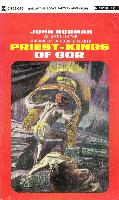
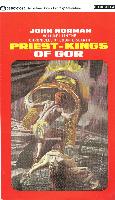

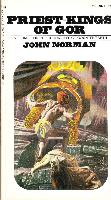

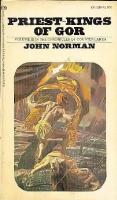

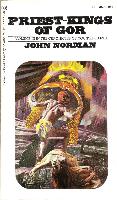
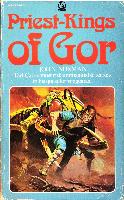

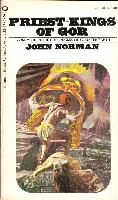
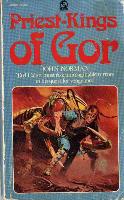
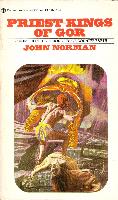
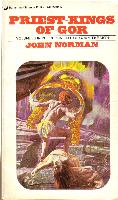
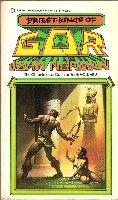

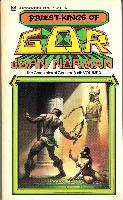
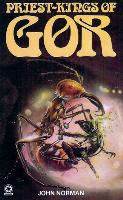
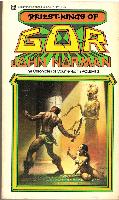



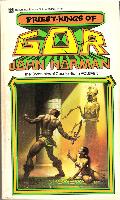

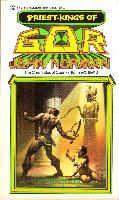
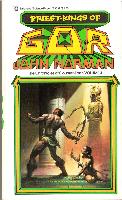


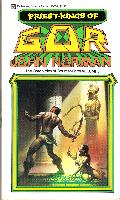
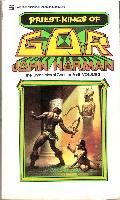
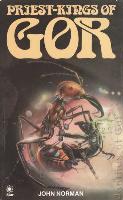
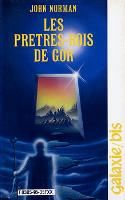
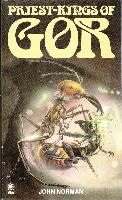

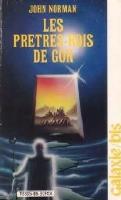
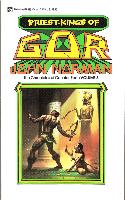




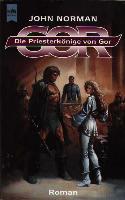
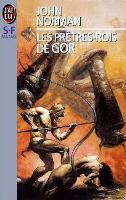







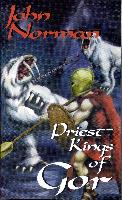
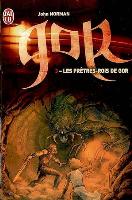





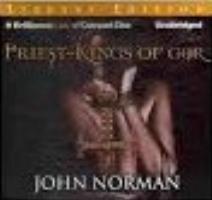
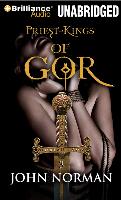

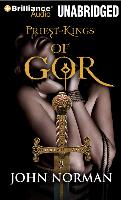
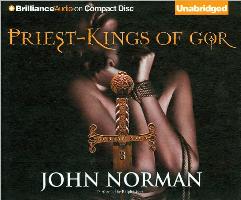


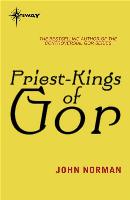
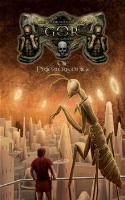
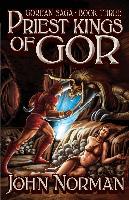

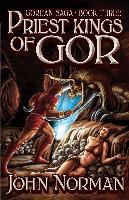

 Cover Gallery (edition)
Cover Gallery (edition)Here is a cover gallery showing all the editions and printings of Priest-Kings of Gor, sorted by edition. Click on any cover to see the book.







































































 This page is copyright © 2000/2013 by Simon van Meygaarden & Jon Ard - All Rights Reserved
This page is copyright © 2000/2013 by Simon van Meygaarden & Jon Ard - All Rights Reserved